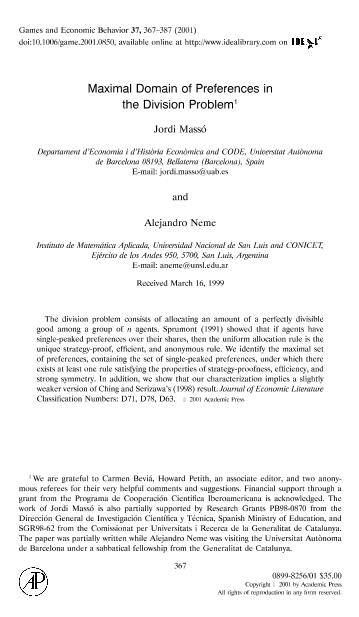Artículo
Maximal domain of preferences in the division problem
Fecha de publicación:
12/2001
Editorial:
Elsevier
Revista:
Games and Economic Behavior
ISSN:
0899-8256
Idioma:
Inglés
Tipo de recurso:
Artículo publicado
Clasificación temática:
Resumen
The division problem consists of allocating an amount of a perfectly divisible good among a group of n agents. Sprumont (1991) showed that if agents have single-peaked preferences over their shares, then the uniform allocation rule is the unique strategy-proof, efficient, and anonymous rule. We identify the maximal set of preferences, containing the set of single-peaked preferences, under which there exists at least one rule satisfying the properties of strategy-proofness, efficiency, and strong symmetry. In addition, we show that our characterization implies a slightly weaker version of Ching and Serizawa's (1998) result. Journal of Economic Literature Classification Numbers: D71, D78, D63.
Palabras clave:
MAXIMAL DOMAIN
,
PREFERENCE
Archivos asociados
Licencia
Identificadores
Colecciones
Articulos(IMASL)
Articulos de INST. DE MATEMATICA APLICADA DE SAN LUIS
Articulos de INST. DE MATEMATICA APLICADA DE SAN LUIS
Citación
Neme, Alejandro José; Jordi, Massó Carreras; Maximal domain of preferences in the division problem; Elsevier; Games and Economic Behavior; 37; 2; 12-2001; 367-387
Compartir
Altmétricas




